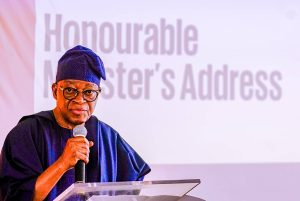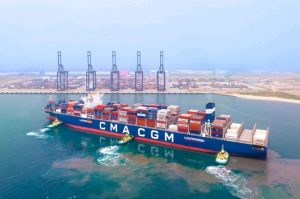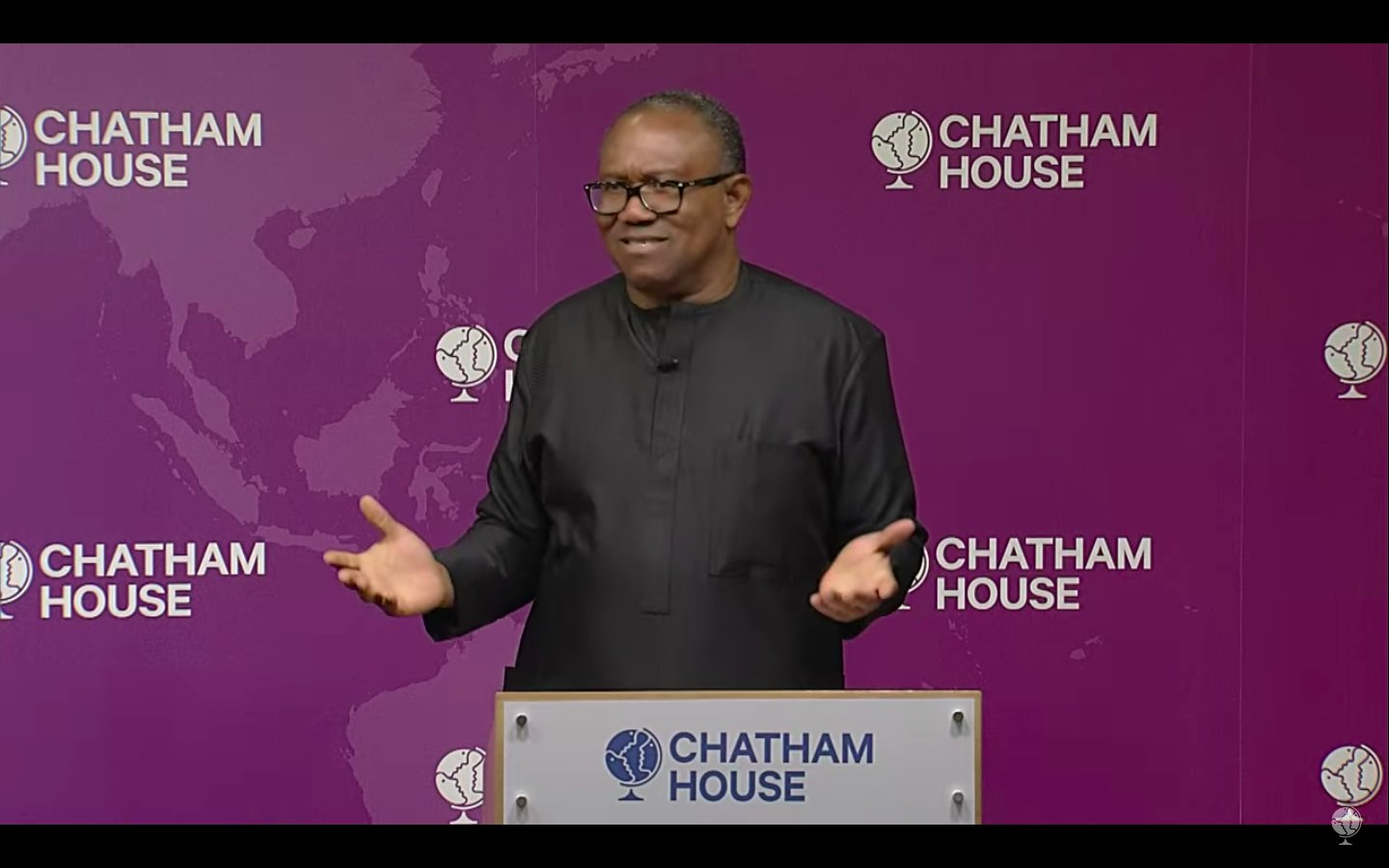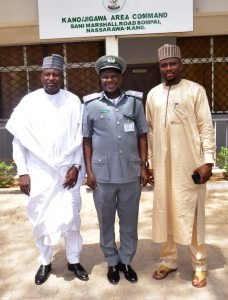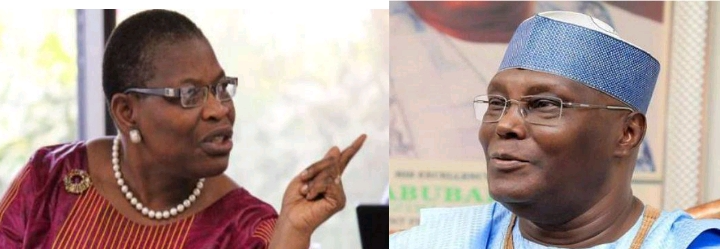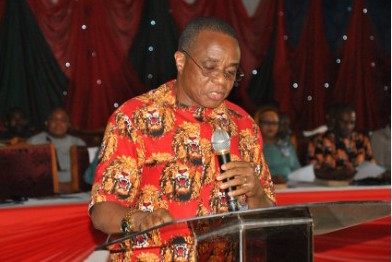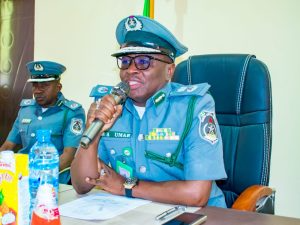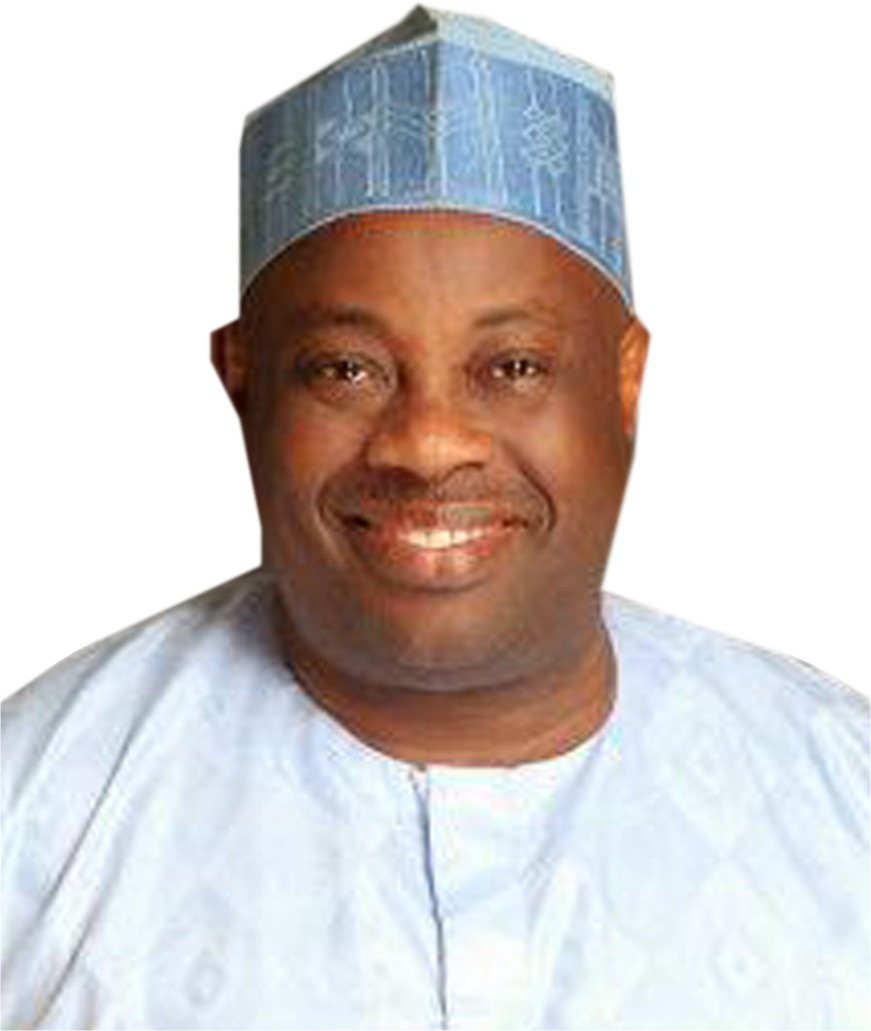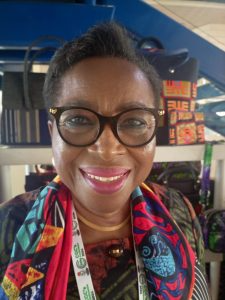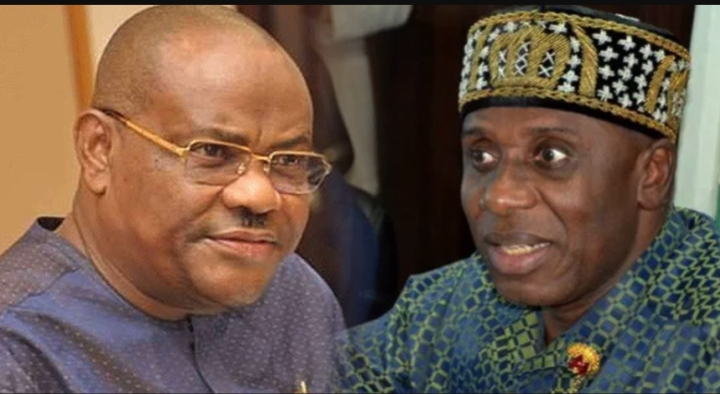Labour Party presidential candidate, Peter Obi was at Chatham House in London on Monday to speak about his plans for Nigerians ahead of the February 25, 2023 general elections.
Obi, who stated that the Nigerian state is captive to an elite gang-up, unveiled his agenda to “take back Nigeria”, hinged on seven priority programs, while also promising that resources will be most prudently used.
He spoke about how his administration will end insecurity, provide stable electricity, move Nigeria from consumption to production, institutional reforms, enhance human capital by investing in education and leapfrogging Nigeria into the fourth industrial revolution through science and technology.
According to him, Nigeria is at a critical juncture and the people, led by the youths brutalised by bad leadership, are awake and leading the movement to transform Nigerian politics and restart the engine of economic growth and social stability.
In agreement to the primacy of gratitude among human virtues, please allow me to begin today with words of gratitude. I am most grateful to Chatham House, Dr. Alex Vines, and his team for the global impact of their mission and commitment to engagement with Nation-building in Nigeria. In providing this global platform to interrogate the vision of those seeking to lead Nigeria, at this time when clear existential threats as I will discuss shortly are pervasive across our dear country, this Chatham House event challenges us to new thinking.
We have alarming insecurity that has led to the loss of many lives and properties, a significant decline in food and economic output, immense trauma that has compromised the mental health of communities, and in some cases, irredentist pressures and disaffection with the Nigerian project. The economy is in crisis with a troubling debt profile worsened by oil theft of proportion once hard to even imagine, two economic recessions in six years, and a lamentable power sector that significantly constrains manufacturing and social life.
The Nigerian state is captive to an elite gang-up and a rentier political economy that has concentrated political power in the hands of those who came to power and influence mainly through their own contrivances and not through the affirmation of the people, and therefore, do not have the incentive to serve the people’s interest.
Even after exploiting ethnic and religious cleavages and sentiments to ascend to political power, the very people on whose sentiments they grabbed power often become the primary victims of such political fraud that has rendered Nigeria a failing state with a worsening leadership crisis. Consequently, Nigeria’s Democracy has been on the wane, evident in the Afrobarometer longitudinal tracking which reveals low voter turnout and apathy in the current Republic.
But this seems to have turned around dramatically last year, allowing the Independent National Electoral Commission (INEC) to register over 12 million new voters, with many more complaining they wished to register but were unable to make INEC deadlines. What prompted this turn-around? The reasons for these very high stakes are lurking in facts of demographics, with our dominant population (the youths) frustrated and unhappy with the status quo and the diminished opportunities in Nigeria in an age of globalization when the Internet easily reveals to them the prosperous homes of those who live in better-led and governed countries.
How did we (Nigeria) plunge into such economic decline that we have overtaken India as home to the biggest pool of the absolute poor in the world? While the poverty rate in India is about 16%, that of Nigeria is about 63% with about 133 million Nigerians classified as multidimensionally poor! This is unacceptable and needs to change! What Nigeria needs is a Great Escape as the 2015 Nobel prize winner in Economics Angus Deaton of Princeton University elucidated, that what separates poor & rich is attributable to Health & Education. But what provides Quality Health and Educational Systems for a society? Committed and Focused Leadership that can Build and Sustain Public Wealth as I was told by Professor Donald Jacobs of The Kellogg School of Management.
In many ways, this is at the heart of my remarks today which are deeply rooted in my upbringing, particularly my mother’s counsel that I live a life of positive impact and manage both personal and public resources most prudently for sustainable/inclusive growth and development of the society. It is the principle that guided my stewardship as Governor of Anambra State, Nigeria, and led to our much-commended performance with some priced awards to show for it. Some of the awards were for outstanding accomplishments in key Millennium Development Goals (MDGs) now Sustainable Development Goals (SDGs). It is the same counsel and principle that is guiding and motivating me to offer to serve in a New Nigeria!
The answer lies in an understanding of Leadership, Institutions, and Demographics. The good news is that demography is driving the change we are seeing in Africa with election after election in the last year in Africa, in which the establishment parties are being turned by new or small parties. It is for this change that my vision of policy change and institutional development is rooted in the push for a broadened scope of SOCIAL MOBILITY AND FREEDOM for Nigerians, particularly our children and youth. Like Former British Prime Minister Harold McMillan said at the start of the Independence decade, a wind of change is blowing through Africa. Today a new wind of change sees the ballot box as being instrumental in changing of bad leadership.
Senator Yusuf Datti Baba-Ahmed, my running mate, and I are committed to a new politics that starts with the ethics of servant-leaders and is anchored on the marriage of clean hearts and skillful hands. We know that unless we change our politics by changing our political leadership, we are stuck in this terrible state of underdevelopment and misery. We will patriotically reform our institutions particularly ones directly responsible for implementing Government policies to make them fit for purpose. It is not to be doubted on the global scene that Nigeria is blessed with some of the most entrepreneurial youths in the world, in science, in business, in art, and entertainment.
We believe that what remains is to change the leadership class from predators to creators of value; from those whose wealth and power derive from the destitution of the nation and its people to those who have demonstrated the competence, character, and capacity to invest in human development, create prosperity, and instill the right values and ethical conduct deserving of servant leaders.
Nigeria today is at a critical juncture and the people, led by the youths brutalized by bad leadership, are awake and leading the movement to transform Nigerian politics and restart the engine of economic growth and social stability. We count ourselves honored to be trusted especially by the youths, to lead this democratic revolution and we deeply pledge to do so with sincerity, accountability, and unquenchable love and desire for a better Nigeria. We are simply, the symbol of the Nigerian youths’ struggles to reverse the ugly trend that keeps driving them into social anomie, despair, and rejection of their beloved country. We are determined to do everything that needs to be done to rescue and lead our beloved country to prosperity, freedom, security, and peace. We will use merit to assemble competent Nigerians from all sections of Nigeria to form an effective Government of National Unity.
At the heart of my goal here today is to look at our Labour Party’s key policy planks and how they will drive up the quality of life of the average Nigerian, dramatically reduce poverty, and return Nigeria to a place of strategic relevance in a world that needs a thriving and well governed Nigeria stabilizing the continent of Africa, making it a high value add for a planet imperiled by environmental challenges, terrorism and inequity. I also plan here to speak on institutions and how the leadership we offer can facilitate the evolution of stronger institutions, with the rule of law as a key anchor of nation-building in Nigeria.
I have no doubt that the policy choices we favour, and the strong institutions La
bour Party will facilitate, will move Nigeria from a country of rent seekers sharing Oil receipts and consuming conspicuously, to one that produces, based on vast factor endowments whose value chains can move us towards a high employment economy. We will turn our youth bulge to a demographic dividend, rather than today’s harvest of a time bomb of violence and insecurity from the uneducated, unemployed, and marginalized.
This forms the first and most important thrust of my governance priorities without which the rest may not be achieved: “To secure Nigeria, end banditry and insurgency, and unite our dear nation to manage our diversity, such that no one is left behind”. The growing insecurity in Nigeria is not because the enemy is formidable, it is rather because of lack of focused leadership, ineffective security governance structure, and poor coordination from the center. All these need to be addressed by first, projecting strong leadership signals that allow both state and non-state actors to be mobilized around a single vision.
Then, by pursuing a robust reform of the security governance structure with a strong coordinating mechanism that assures that all levels of government – federal, state, and local (with a 3-level policing structure) – are aligned with strong collaboration with partners from both the private sector and development groups to provide the required services and deliver results for every Nigerian. Once this is done, it is also important to have a single, clear, coherent, and consistent communication system to keep the government accountable, and citizens engaged and involved in the development process. It is important for institutions to be able to provide strong leadership, and coordination capability, partner, and engage collaboratively with all relevant stakeholders in an environment that mutually reinforces values.
The second plank of my policy thrust is to “Shift emphasis from consumption to production by running a production-centered economy that is driven by an agrarian revolution and export-oriented industrialization”. With about 70 million hectares of arable land, we will pursue an agricultural revolution through proper segmentation of Nigeria to activate and harness the factor endowments of different parts of the country for both rapid and mechanized agricultural development and as a pillar for Nigeria’s other sectoral development and industrialization. We will incentivize and invest in agro-cluster and industrial cluster development across our geo-resource zones to take advantage of agglomeration and scale effects particularly in the North-West, North-East and North-Central regions of Nigeria. We will dredge both Rivers Niger and Benue, build dams, and massively support the planting of economic trees across the country for local usage, poverty elimination, export and revenue generation.
A key task is to sequentially but decisively, dismantle the inefficient and anti-market distortionary structures restraining the Nigerian economy from creating the preconditions for a dynamic pro-market economy. We will employ entrepreneurial governance to dismantle impediments to free trade and ease of doing business and implement radical economic policies that will drastically reduce our debt service – a major drain on government revenue today. Our Micro, Small, and Medium Scale Enterprises (MSMEs) will be robustly supported. Further borrowing will be strictly for productive purposes. While we will aggressively pursue the activation of all opportunities in the oil and gas value chain, we will use targeted incentive schemes that will be professionally administered to diversify our non-oil export portfolio with proper consideration and management of climate change risks and opportunities.
The third pillar of our governance priorities is to “Restructure the polity through effective legal and institutional reforms to entrench the rule of law, aggressively fight corruption, reduce the cost of governance, and establish an honest and efficient civil service”. Reducing the cost of governance in Nigeria is an effective way to fight institutional corruption. In addition to reducing the cost of governance and streamlining government operations for efficiency and effectiveness, we will ensure that reforms are pursued in a way that protects the livelihood of our hardworking and efficient civil servants.
Critical to fighting corruption, we shall install a new budgeting system founded on the cardinal principles of public accountability, objective setting, and program implementation. This is against the extant budgetary principles of revenue mobilization, expenditure allocation, and borrowing without emphasis on monitoring, evaluation, and feedback. We will enforce the principle of performance auditing and institutionalize the monitoring and evaluation process of the entire public service delivery as the primary means of actualizing our vision of a new Nigeria. This reform will institutionalize the personal involvement of the President in setting budgetary objectives of MDAs, and monitoring and evaluating the implementation process through the Office of Regulatory Review in the Office of the President. Budget monitoring and evaluation capacity will be strengthened within the Presidency.
We will embark on effective macro-economic and fiscal restructuring to quickly restore fiscal viability by discontinuing unaffordable subsidies which have left a black hole in government finances. Fiscal and monetary policy will be properly coordinated, with each deploying conventional tools transparently instead of distorting markets to favour a few privileged persons. For the avoidance of doubt, we will collaborate with the Central Bank of Nigeria for the transparent liberalization of the foreign exchange market and the dismantling of the opaque multiple exchange rate regime which effectively subsidizes a few privileged persons.
We will also seek to boost the supply side, rather than continuing to concentrate exclusively on demand management of the foreign exchange market. When unaffordable subsidies are removed, some carefully calibrated transfers will be used to cushion any adverse impact on the economically weak. If the competitiveness of a sector is to be enhanced, then that will be done via the enactment of transparent and specially targeted fiscal and trade policies designed to stimulate investment and growth. Revenue shortfalls and leakages such as oil theft will be dealt with decisively by holding persons in positions of authority fully accountable.
The fourth plank of our governance priorities is to “Leapfrog Nigeria into the 4th Industrial Revolution through the application of scientific and technological innovations to create a digital economy”. Building on the gains of the agriculture-led manufacturing and export, we will pursue the development of knowledge and skills to leverage on the emerging disruptive digital technologies, automation, Internet of Things (IoT), artificial intelligence, robotics, virtual reality, blockchain technology, biotechnology, and data science – all of which are at the heart of the fourth industrial revolution.
The fifth plank of our governance priorities is to “Build expansive infrastructure for efficient power supply, rail, road and air transportation, and pipeline network, through integrated public-private partnerships, and entrepreneurial public sector governance”. Our solution to the perennial power problem in Nigeria is a comprehensive one that covers transmission, distribution, generation, and financing as detailed in our Manifesto. However, we will immediately complete the $2.3b Nigeria-Siemens network improvement deal to achieve 7,000 MW stable capacity by the end of this year (2023), 11,000 megawatts by 2024, and 25,000 megawatts by 2025. We will support the local manufacturing capacity of power technologies and encourage and expand local R&D in universities, training centers, and workshops through which many jobs will be created.
Our 6th priority program is to “Enhance the human capital of Nigerian youths for productivity and global competitiveness through investment in education and research, quality healthcare, and entrepreneurship education”. The World Bank’s Human Capital Development Index ranks Nigeria 168 out of 173 countries. To move Nigeria right to the top bracket of the index, we will pursue a Marshall Plan-type program on education that incorporates compulsory technical and vocational skills, sports, entrepreneurship, programming, and digital skills from the primary to the secondary level. In line with this commitment to transform our educational sector, we will prioritize the funding of this critical sector. Our tertiary institutions will be remodeled to serve as hubs or centers for research, development, and commercialization of ideas for the quick industrialization of Nigeria.
Finally, our 7th priority is to “Conduct an afro-centric diplomacy that protects the rights of Nigerian citizens abroad and advances the economic interests of Nigerians and Nigerian businesses in a changing world”.
CONCLUSION
In conclusion, let me say that the problem with Nigeria is at once complex and simple. It rests on leadership. As our erudite Professor Chinua Achebe stated, ‘’The trouble with Nigeria is simply and squarely a failure of leadership’’. In Achebe’s view, there is nothing basically wrong with the Nigerian character. ‘’The Nigerian problem is the unwillingness or inability of its leaders to rise to the responsibility, to the challenge of leading in the front by example which is the hallmarks of true leadership’’.
When people of competence, character, commitment, and compassion take over leadership and pursue their mission and task with the seriousness required, a New Nigeria characterized by peace, unity, prosperity, and inclusiveness will be achieved and sustained. That is what is driving Datti Baba-Ahmed and me to join and offer to lead this desire and crusade of Nigerians, particularly our youths, for an inclusive and sustainable Nigeria that works for all.
In line with my upbringing, especially my Mother’s counsel, my promise is that Nigeria’s resources will be most prudently used and as the Commander in Chief, I Peter Obi sincerely pledge that Our Pact with Nigeria will be diligently pursued to create a new Nigeria characterized by sustainable/inclusive growth and development.
Ismail Aniemu, Publisher of JournalNG and ghost writer, is a maritime journalist of over two decades’ of practice with multidisciplinary background. He holds a masters degree in Transport Management from Ladoke Akintola University of Technology(LAUTECH) with bias for logistics. He is also an alumnus of the Times Journalism Institute where he obtained a post graduate diploma in Journalism.
